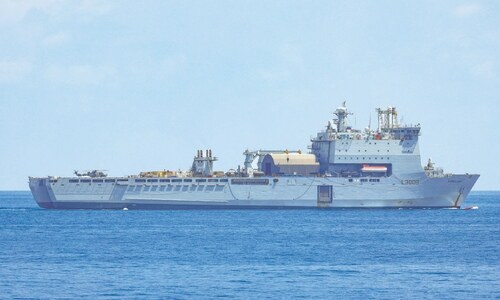Zalmay Khalilzad, the veteran US diplomat tasked with leading efforts to end the war in Afghanistan, is a blunt negotiator with a history of hawkish foreign policy views.
Known by many in Washington as “King Zal”, the 67-year-old Khalilzad has decades of experience in the region. Now he has what US Secretary of State Mike Pompeo described on Tuesday as a “singular” mission to get the Taliban and the Afghan government to reconcile.
This mission marks Khalilzad's return to focus on the country of his birth and childhood, and the place where he served as US ambassador from 2003-2005 under President George W Bush, helping to guide regime change in the messy aftermath of the fall of the Taliban.
He was instrumental in setting up the government structure in Afghanistan and guiding President Hamid Karzai through the first elections in 2005.
Fluent in Pashto and Dari, Khalilzad's experience as a foreign policy operative in the country dates back to the 1980s, when he served as an adviser to the Reagan administration.
He spent most of the 1990s in the private sector, but returned to public service when Bush appointed him to the National Security Council with an Afghanistan brief.
After the Kabul posting the Bush administration appointed Khalilzad — who is also an accomplished arabophone — as ambassador to Baghdad in 2005, despite Karzai reportedly pleading with the US president not to transfer him.
Unlike his smooth stint in Afghanistan, where he cut deals with tribal chiefs and warlords, Khalilzad's Iraq mission was rocky.
He knew the Iraqi political terrain well, having served as Bush's envoy to the “free Iraqis” before the 2003 US invasion, and helped draw up the country's new constitution after the toppling of Saddam Hussein.
But he failed to accomplish a task similar to the one he now faces in Afghanistan: getting Iraq's warring factions to reconcile, and defusing the terrorist core of Sunni Muslim resistance.
Khalilzad was allied with Bush administration hawks like Vice President Dick Cheney and John Bolton, whom he replaced as Washington's UN envoy in 2007. He held the position until 2009.
He later criticised President Barack Obama's handling of the war in Afghanistan, especially the decision to draw down US troops.
Key player
Khalilzad has also been a fierce critic of Pakistan and like many American officials has accused it of playing a “double game” by supporting militant groups in Afghanistan despite being a US ally.
That has won him few friends over the years in Islamabad, which has denied the allegations, and whose support Pompeo said Tuesday was needed for the reconciliation effort in Afghanistan.
Khalilzad was the introductory speaker for then-candidate Donald Trump's first major foreign policy speech in April 2016.
He later told India's The Hindu newspaper that Trump's “America First” policy was not about isolationism, but “the universality of American values”.
Now Khalilzad is a key player in the Republican president's efforts to extricate the US from the 17-year conflict in Afghanistan.
Born in 1951 in the northern Afghan city of Mazar-i-Sharif, Khalilzad attended the American University of Beirut before earning a doctorate from the University of Chicago in 1979.
He taught at Columbia University from 1979 to 1986, and has over the years also held key positions at prominent US think tanks, including the RAND Corporation.
Before his stints as ambassador to Afghanistan, Iraq and the UN, he also served in various capacities in the State Department, the Pentagon and the National Security Council.
Khalilzad also once worked with US oil giant Unocal and runs a business advisory firm called Gryphon Partners.
In 2014, Austrian authorities briefly froze bank accounts belonging to his wife during an investigation into money he transferred from the US. Khalilzad denied any wrongdoing.














































